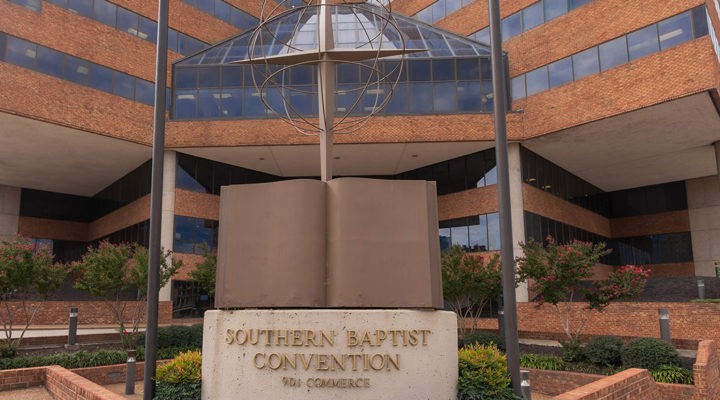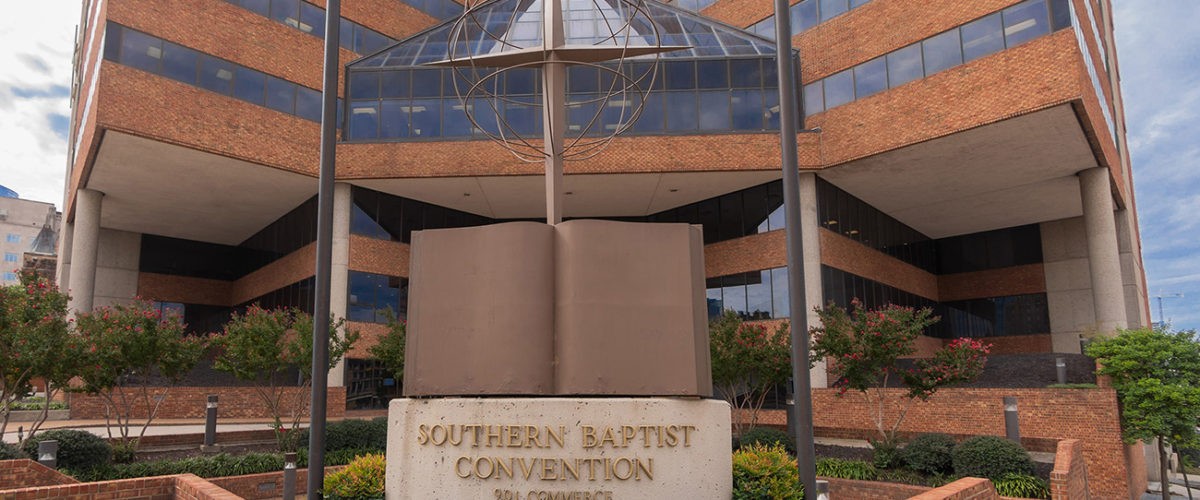First, the Southern Baptist Convention got in trouble for not sharing information about known clergy sexual abusers in its congregations; now it is on trial for spreading undocumented allegations against a Tennessee minister.
On Jan. 8, the Tennessee Court of Appeals ruled on an appeal brought by the SBC seeking to overturn an earlier Circuit Court ruling that said the SBC cannot hide behind the so-called “ecclesial abstention doctrine” in the defamation case brough by Preston Garner and his wife, Kellie Garner.
What’s unique about this case is the public airing of processes used by the SBC Credentials Committee, the entity that recommends whether churches remain in “friendly cooperation” with the SBC. In recent years, the SBC has broken ties with churches that ordained women, allowed women to preach, advanced racist views and employed staff members credibly accused of abuse.
What’s unique about this case is the public airing of processes used by the SBC Credentials Committee.
According to court records, the case against Garner began with an anonymous tip to the abuse hotline established by the SBC Executive Committee after a bombshell 2022 Guidepost Solutions report on mishandled knowledge of sexual abuse. Also according to court records, that anonymous tip was not fully investigated and did not correspond to any police reports, court filings or other documentation that abuse had occurred.
SBC officials sought to dismiss the defamation case on the grounds that such discussions are off limits due to the ecclesiastical abstention doctrine, a legal precedent that says the government cannot meddle in the religious affairs of churches.
However, Judge Kristi M. Davis, writing for the appeals court, rejected that claim, just as the lower court had done earlier:
The SBC and the Credentials Committee argue that the Garners’ claims fall within the scope of the ecclesiastical abstention doctrine because they “necessarily involve the impermissible secular determination as to whether” the inquiry into whether Everett Hills (Baptist Church) was in friendly cooperation with the SBC “was proper.” We do not agree. The conduct at issue is the appellants’ purported publication of written and oral statements that Mr. Garner was “an individual with an alleged history of abuse” and that the allegation was credible, while failing to also state that “the allegation (was) made through an anonymous online portal” and that the appellants “had not made any inquiry into the veracity of the anonymous report, or that no evidence supported the anonymous report.”
Further, the SBC did not raise “any argument that their conduct resulted from the application or interpretation of any religious canon,” the judge wrote. “Moreover, any argument by the appellants that the letter was sent as part of a pastoral disciplinary process is undercut by the concession of the SBC and the Credentials Committee that ‘the Credentials Committee does not “investigate what occurred or judge the culpability of an accused individual,” but rather only reviews “how the SBC church responded to sexual abuse allegations and make(s) recommendations as to whether those actions or inactions are consistent with the SBC’s beliefs regarding sexual abuse.”’”
Abuse reform advocates have not asked the SBC to identify clergy anonymously accused with no record of conviction or confession.
Advocates for greater transparency on known cases of sexual abuse in the SBC have begged for a public database of clergy with known and documented convictions or confessions of sexual abuse. The Executive Committee has not been able to produce such a site, claiming church autonomy as a barrier. Those abuse reform advocates have not asked the SBC to identify clergy anonymously accused with no record of conviction or confession.
Yet that appears to be the case with Garner, who at the time was employed by Everett Hills Baptist Church in Maryville, Tenn. The anonymously alleged abuse of a minor reportedly happened at Englewood Baptist Church in Rocky Mount, N.C., 12 years earlier.
According to the court’s summary of events, in early December 2022, Garner was employed as worship pastor at Everett Hills and as music director at The King’s Academy, a Baptist-affiliated school. That’s when a representative of the SBC Credentials Committee called the church’s senior pastor, Douglas Hayes, and informed him the Credentials Committee “would be sending Everett Hills a letter concerning an individual associated with Everett Hills.”
The pastor asked for more information but was told none could be given.
Over the course of the next month, the pastor continued to seek details about the forthcoming letter from an SBC staff member, “Mrs. Peters,” without result. Finally, he was told there was a “sexually related” allegation against Garner.
The pastor asked for more information but was told none could be given.
According to the pastor’s testimony:
In the second or third conversation with Ms. Peters, she informed me that the allegation was sexually related, but she told me she could not give me any more details. I asked if there was a public record for this allegation. She said she could not tell me. I asked if there was a charge made regarding this allegation. She said she could not tell me. I asked if legal proceedings had been initiated relating to this allegation. She said she could not tell me. I told her that this was a serious allegation, and I asked her if she was sure this was a legitimate claim and, further, if she was prepared to send something in writing supporting the credibility of the claim. She then told me that the Credentials Committee would not be bringing this to me if it was not credible, and she advised I would receive a letter soon. I told Ms. Peters that I wanted to help her get to the truth of the matter, but I could not help without more details. Ms. Peters said she could not give any more details. … I again told Ms. Peters I needed the letter concerning the details of this concern, and Ms. Peters again told me I would receive the letter soon.
He also testified that in January 2023:
I again contacted Peters by telephone to inform her we still had not received the letter and to inquire again as to when we would receive it. I explained to her that it was Mr. Garner’s last week of employment with Everett Hills (because he had accepted a ministry position at another Baptist church), and I wanted to have an opportunity to talk to him before he left Everett Hills. Ms. Peters responded that we would receive the letter soon. I told her this was unfair, and she finally told me that the concern involved contact with a minor. I again asked if there was a police report, and she said she could not tell me. I again asked if legal action had been taken, and she said she could not tell me. She told me that all she could say was that it occurred at another church in North Carolina a long time ago. I told her that she was not giving me much information, and I needed to have something in writing. I asked again if she was sure this was credible, and she again told me that they would not be sending me a letter if it was not credible.
And the pastor also testified to the court: “At no time during any of my telephone conversations with representatives of the Credentials Committee or through written correspondence from the Credentials Committee was I advised or did I know that the allegation made against Garner was made by an anonymous accuser.”
“At no time during any of my telephone conversations with representatives of the Credentials Committee … did I know that the allegation made against Garner was made by an anonymous accuser.”
On Jan. 7, 2023, Peters emailed a letter to Everett Hills saying the church “may employ an individual with an alleged history of abuse” and asked for the church’s response to a set of questions about Garner.
That letter also was sent to Randy Davis, president of the Tennessee Baptist Mission Board, who forwarded it to The King’s Academy.
According to the court record: “The King’s Academy immediately suspended Mr. Garner’s employment and prohibited him from being on its campus. Ultimately, The King’s Academy terminated his employment. Additionally, at the time the letter was sent, Mr. Garner had already resigned from his position at Everett Hills and had accepted a position as legacy adult pastor at First Baptist Church Concord (Tenn.) However, Concord withdrew its offer of employment upon learning of the inquiry by the Credentials Committee.”
That chain of events set up the defamation case brought by the Garners.
The couple’s attorney, Bryan Delius, told the Nashville Tennessean: “Any reasonable person that looked at this procedure would find it horrendous. You set up a mechanism where anyone could make an anonymous statement. It’s unvetted, completely unvetted and then you’re going to repeat that as if it were true?”
Delius reiterated his client’s denial of any alleged abuse and said they welcomed the Tennessee Court of Appeals ruling.
The case has significant implications for several reasons.
First, it draws attention to the secretive process used by the SBC Credentials Committee, which already is under scrutiny both for overstepping its bounds and for not doing enough.
Second, it bolsters the claims of those who do not believe the SBC ought to play any role in policing sexual misconduct in autonomous congregations.
Third, it shows the legal limits of the SBC’s reliance on the ecclesial abstention doctrine.
The appeals court has sent the case back to the trial court for adjudication.


